An essential guide for those wanting to study abroad in Japan. In this article, we introduce your 3 pathways to an education in Japan and the 7 important steps to realising your dream. Learn the requirements to study in Japan and important things to know about living in Japan.
Table of Contents
- Three Main Pathways to an Education in Japan
- Want to Study in Japan? 7 Steps to Realising that Dream
- Requirements for Studying in Japan
- Things You Need to Know About Living in Japan
- Takeaway
Three Main Pathways to an Education in Japan

There are 3 main options when it comes to seeking an education in Japan.
1. Study at a Japanese Language School
For those who are only interested in learning Japanese and experiencing Japan’s culture. There are a large number of Japanese language institutions across Japan. With a little research, you can find a school that fits your learning style, goals, and even budget. With so many schools available, it’s important you know how to choose a good Japanese language school.
-
Introducing Japanese Language Schools in Tokyo and Across Japan
-
Introducing ISI Japanese Language Schools
2. Enter University or Vocational / Technical College After Japanese Language School
After studying at a Japanese language school, some students choose to
-
return to their home country,
-
continue studying at the Japanese language school,
-
enter university or vocational / technical school.
There are many reasons to pursue further studies in Japan such as world-ranked Japanese universities, even more time and opportunity to travel Japan, and scholarships to study for free!
3. Direct Entry to University or Vocational / Technical College
With English conducted courses, or perhaps you have sufficient Japanese proficiency, it is possible to enter university or vocational/technical school directly from your own country.
When taking this path, keep in mind that you should contact the school to ask about entry requirements and request for application materials. You may have to sit for the Examination for Japanese University Admission for International Students (EJU), a university entrance exam for international students, in your own home country.
In this article, we will be focusing on undergraduate studies in Japan. For post-graduate studies and research in Japan, go here:
Writer's Pick
Want to Study in Japan? 7 Steps to Realising that Dream
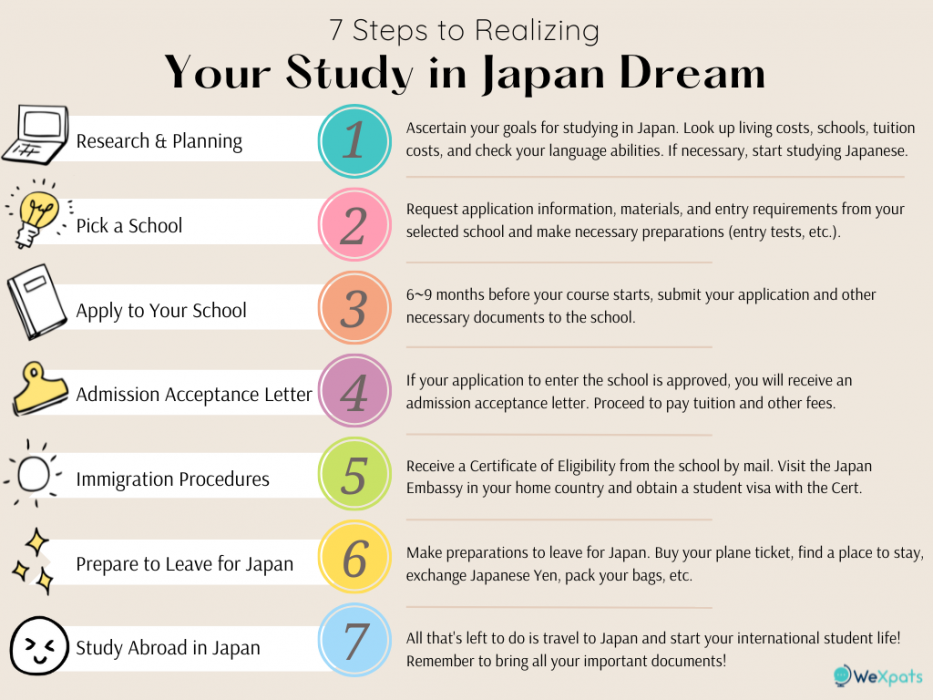
1. Research & Planning (1~2 Years Before Leaving Japan)
Ascertain your goals for studying in Japan. Look up living costs, schools, tuition costs, and check your language abilities. If necessary, start studying Japanese.
Identify your reasons and goals for studying in Japan. Ask yourself questions all sorts of questions, starting from:
-
What do I want to study in Japan?
-
How long do I want to study there?
-
What do I want to achieve whilst I’m there?
-
When do I want to go?
Then moving on to questions about the finer details of studying abroad:
-
Which part of Japan do I want to study in?
-
How is my Japanese language ability?
-
What schools offer what I want to study?
-
Do I satisfy the entry requirements?
-
What semester will I be joining?
-
How much will it cost for me to study and live in Japan?
-
Am I financially capable of this study abroad plan? If not, what can I do?
-
If my ideal plan is not feasible, what other options do I have?
and more.

You may find it easier to answer these questions by doing research into options available to you. Look up:
-
Universities, language schools, technical/vocational schools, etc. educational institutions
-
Check entry requirements, tuition fees, available courses at places you are interested in
-
Identify the cost of studying at schools of interest
-
Identify cost of living in Japan, especially where you will be living
-
Whether there are scholarships available to you
-
The current foreign currency exchange rate for your country’s currency and Japanese Yen
Last but not least, prepare a plan based on your research findings. Note that spending 1~2 months time for research & planning 1 year ahead of attending Japanese language school may be sufficient, but 2 years ahead is recommended for direct entry to university as it is better to have ample time to prepare for the EJU entrance examinations or the school’s own entry exams.
2. Pick A School
Request application information, materials, and entry requirements from your selected school and make necessary preparations (entry tests, etc.).

At this stage, you should have shortlisted some schools and courses from your research. Reach out to the schools requesting for application information including application materials, entry requirements, and advice on how to proceed. The ideal time to do is:
For Japanese Language School
|
Course Starts |
Request Document By |
|
January |
May (Year Before) |
|
April |
July (Year Before) |
|
July |
November (Year Before) |
|
October |
January (Same Year) |
For Universities
|
Course Starts |
Request Document By |
|
April |
April - May (Year Before) |
|
October |
October - November (Year Before) |
※ Note: This is a general guide, please check individual school’s schedules.
Depending on the school, they may email / post mail brochures and application materials, arrange a video call to explain things to you, suggest you visit a Japanese education fair they will be appearing at in your area, or even connect you with a liaison in your home country.
Follow the application procedure to a tee and mind the dates for entrance exams and qualification exams like JLPT or TOEFL (if necessary), and deadlines for applications.
※ JASSO, “Planning Studies in Japan”
3. Apply to Your School (6~9 Months Before School Starts)
6~9 months before your course starts, submit your application and other necessary documents to the school.
Passed your entrance examinations, got your necessary documents and certifications, it’s time to send in your application and attached documents to the school you want to attend. At this stage, you will incur application fees which is quite a hefty sum.
Admission Fees
For national universities in Japan, admission fees for full term courses are a standard amount of 282,000 yen according to the Ministry of Education's Ministerial Ordinane of National Universities Tuition and Other Related Fees.
For private universities in Japan, admission fees for full term courses are not fixed and cost around 267,608 yen on average according to the Ministry of Education's Survey of Average Payments in Private Universities (2012).
Same as private universities, Japanese languages school's admission fees are not fixed. The price can vary from 20,000 yen to 60,000 yen depending on course length.
For Japanese Language Schools
|
Course Starts |
Submit Application By |
|
January |
July- August (Year Before) |
|
April |
September - October (Year Before) |
|
July |
January - February (Same Year) |
|
October |
March - April (Same Year) |
For Japanese Universities
Japanese Universities have 2 enrollment periods a year in April (spring semester) and October (autumn semester).
|
Course Starts |
Request Document By |
|
April |
August - October (Year Before) |
|
October |
February - April (Same Year) |
※ Note: This is a general guide, please check individual school’s schedules.
※ JASSO, “Planning Studies in Japan” ※ University of Tokyo, "Admission Fee and Tuition"
4. Admission Acceptance Letter
If your application to enter the school is approved, you will receive an admission acceptance letter. Proceed to pay tuition and other fees.
Note that some schools will have you sit for the entrance exam after submitting an application, always check with individual universities schedules to ensure you get the correct information. Interviews may also be part of the process. After you receive your admission acceptance letter, generally you will be required to make payment first.
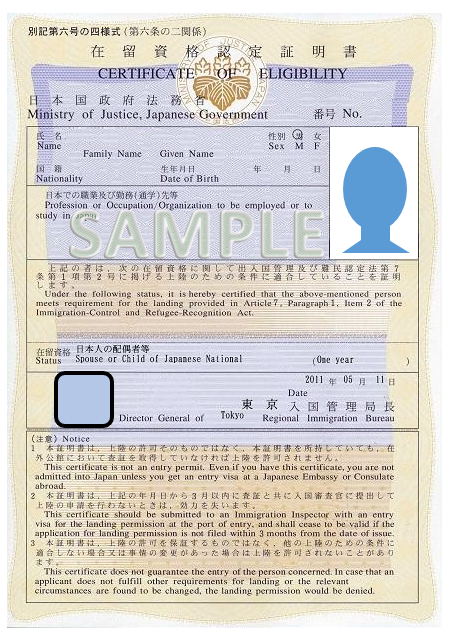
Image Credit: © 2012-2019: Consulate-General of Japan in Sydney
Upon receiving your payment, the school will apply to immigration for a Certificate of Eligibility (COE) which you require for getting a student visa. It’ll take 1~3 months for the COE to be issued.
5. Immigration Procedure
Receive a Certificate of Eligibility from the school by mail. Visit the Japan Embassy in your home country and obtain a student visa with the Cert.
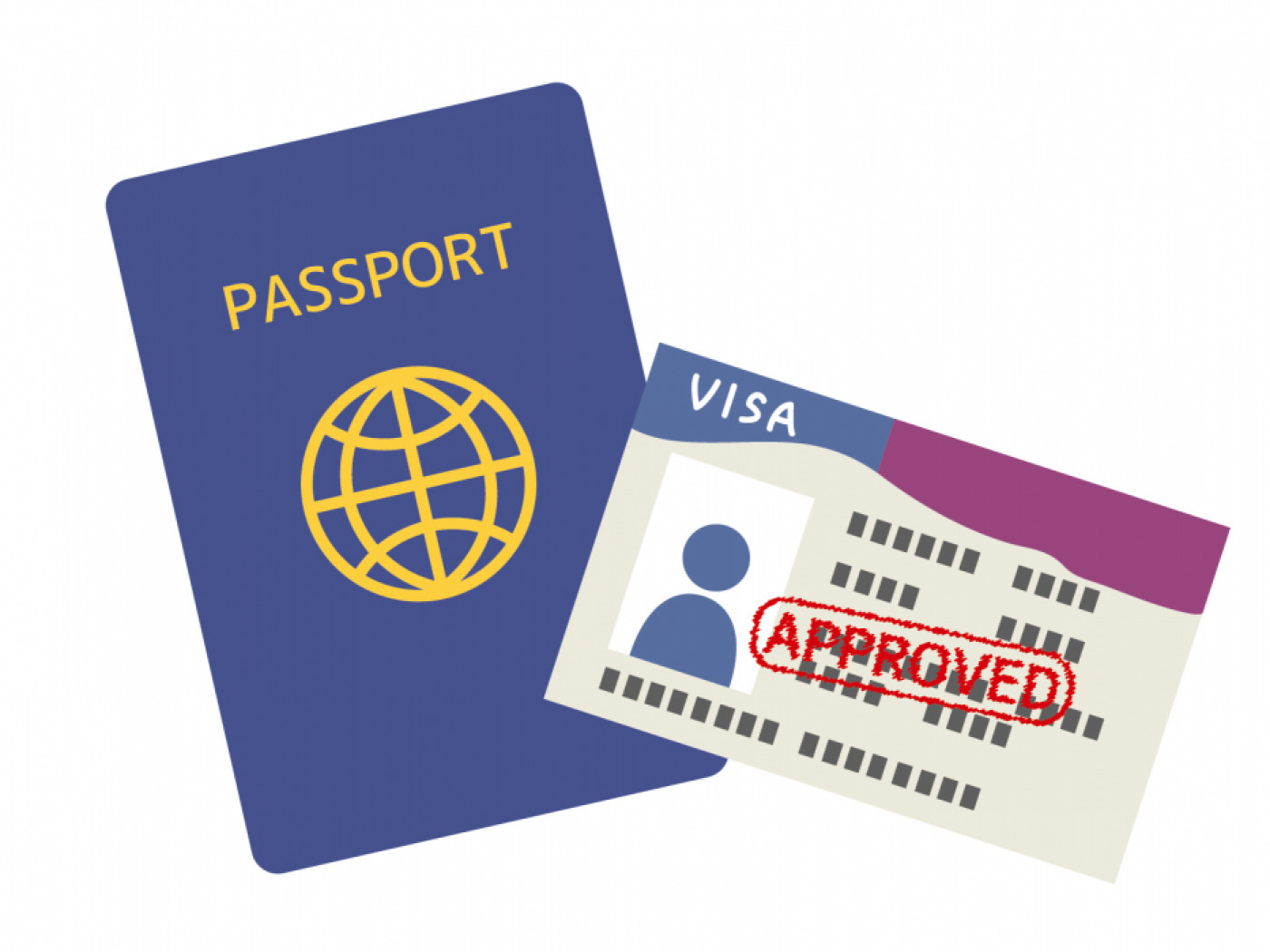
Receive the COE from the school through the mail, you need the physical original copy. Visit the Japanese Embassy in your home country bringing:
-
Valid Passport
-
Visa Application Form
-
1 Photograph (45mm x 35mm) taken within 6 months
-
Certificate of Eligibility - Original and 1 Copy
-
1 Confirmation Letter
Other documents may be necessary depending on your nationality, just in case, check the website of the Japanese Embassy in your country.
Note: In light of the Covid situation, entry procedures may be updated from time to time. We recommend checking the latest announcements on Ministry of Foreign Affairs of Japan website for updated information and requirements.
※ MOFA, “General Visa: Student”
6. Prepare to Leave for Japan
Make preparations to leave for Japan. Buy your plane ticket, find a place to stay, exchange Japanese Yen, pack your bags, etc.

Once you receive your student visa from immigration, it’s time to plan your travel to Japan:
-
Arrange flight tickets and travel insurance
-
Find a place to stay - school dormitory, sharehouse, etc.
-
Exchange Japanese yen
-
Enable credit/debit card for overseas usage
-
Packing luggage - essentials, important documents, passport, etc.
Note: In light of the Covid situation, quarantine and other Covid-related procedures may be in place when you are travelling. Check relevant websites beforehand to keep updated, and more importantly to make sure you are eligible to fly to Japan. Resources:
-
Ministry of Health, Labour and Welfare Coronavirus (COVID-19)
-
Ministry of Health, Labour and Welfare COVID-19 Negative Test Result Certificate before Departure
7. Study Abroad in Japan
All that's left to do is travel to Japan and start your international student life! Remember to bring all your important documents!

And that’s it, you’re done and ready to start your new study abroad life in Japan! To enter Japan, you will need to show at the airport's immigration counter your valid passport, student visa, and COE. In return, you will receive a residence card which you must carry with you at all times. Note that smaller airports cannot give you a residence card on the spot, you will have to apply to your nearest municipal office and receive it by mail to your address in Japan at a later date.
Also, don’t forget to show up for your first day of school amidst the excitement of being in Japan!
Requirements for Studying in Japan
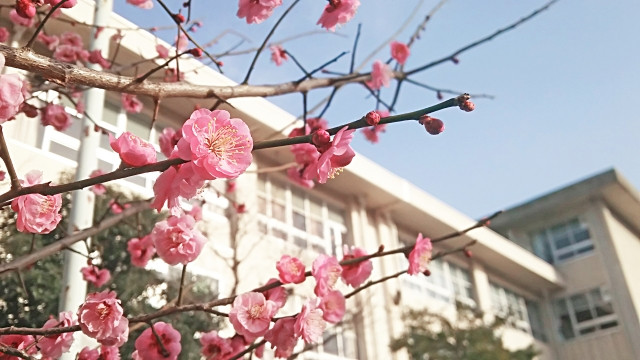
Student Visa and Proof of Finance
Securing a student visa is a must to be permitted to enter Japan for studies. In line with this, it is also an immigration requirement to provide proof of funds. This is to ensure students who enter the country are capable of supporting themselves in Japan. Approval and bracket of income you need to provide will depend on the cost of tuition fees, duration of stay in Japan, and other living conditions. You will need to provide documentation about who will be funding your studies and how, for example your own or a parent’s bank account balance statement.
※ Immigration Services Agency of Japan, “在留資格「留学」”
Higher Education Requirement: Completed 12 Years of Study
One of the requirements to study in a Japanese university is to have completed a total of 12 years of formal studies. This includes primary, secondary, and high school education. If you have not achieved these 12 years of study, you will need to join a 1~2 years university preparatory course, or pre-college studies, before applying.
※JASSO, "Study in Japan Basic Guide"
Japanese Language Proficiency
This depends entirely on what course you plan to take.
For Japanese Language Schools
If you have zero knowledge of Japanese, you will automatically be assigned to the beginner’s class. But for students with prior knowledge of Japanese and/or JLPT certifications, an assessment test will be administered to assign you to a class appropriate to your level.
We recommend reading up about Japanese lessons in Japanese language schools, and perhaps attempt to skip the super beginners classes on Hiragana and Katakana which you can study yourself.
For University and Technical/Vocational Schools
There are Japanese universities that offer courses taught entirely in English. Though Japanese knowledge is helpful for your day-to-day interactions, it is not necessarily a requirement to enter these universities. Universities may even provide Japanese lessons to help you out.
But, if you’re planning to take a course taught in Japanese, then yes a certain level of Japanese proficiency is required for you to be able to follow lessons. Check with relevant universities for the required level of Japanese proficiency.
English Language Proficiency
Proof of English proficiency may be required during application for some universities. This is especially so for non-native English speakers. Check with the university whether this is required, and if yes what tests are acceptable and acceptable score for the pertaining test.
For your reference, there are quite a number of English proficiency tests including IELTS, Eiken, TOEFL, and TOEIC.
※ JASSO, “Examination used for Studying in Japan”
Things You Need to Know About Living in Japan

Cost of Living Differs From Area to Area
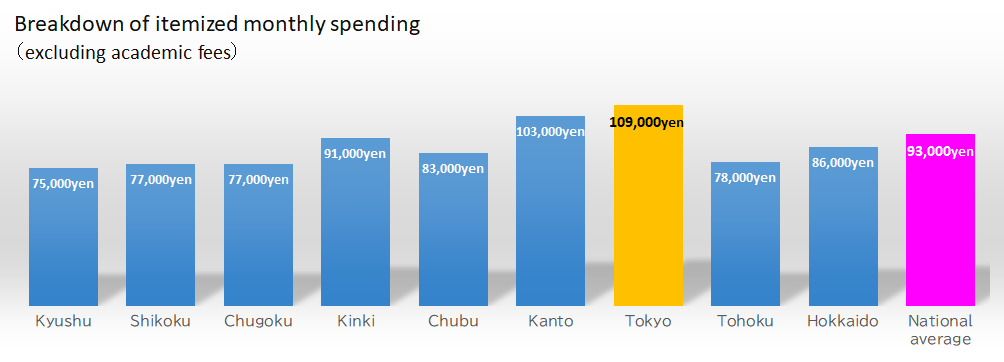
Image Credit: © JASSO
Tokyo may be the most popular city that attracts many international students but it also has the highest cost of living in Japan. Note that Tokyo life can be busy and fast-paced, there’s nothing wrong with choosing a smaller city if it's to your preference. Plus, Tokyo’s cost of living may be higher but so is its minimum wage. You can consider working whilst studying to support your living expenses in Tokyo.
Living Expenses in Japan Will Include
Since you may not be familiar with living in Japan, or with living alone, here’s a list of expected expenses to cover (excluding academic fees):
-
Rent
-
Utilities (Electricity, Gas, Water)
-
Food (Groceries, Eating Out)
-
Internet (Mobile, Apartment)
-
Commute (Train, Bus)
-
Health Insurance, Medical
-
Entertainment (Hobbies, Outings, Shopping)
-
Self-Care (Hair Salon, Skincare Products, etc.)
-
Miscellaneous (Household Supplies, etc.)
Keep in mind also the initial costs that come with moving to Japan like buying basic household goods, furniture, textbooks, etc.
Student Accommodation Options
When choosing a place to stay, balance the benefits, disadvantages and costs that come with each type of accommodation. Common student accommodation options include:
-
Student Dormitory
-
Sharehouse
In Japan, a guarantor is required when renting an apartment. For international students, ask your university whether they can act as a guarantor for you. Some schools have a selection of housing options aside from dormitories for students, or are open to being guarantor to apartments.
Experiencing Culture Shock in Japan
Majority of international students and foreign nationals experience culture shock at some time or other after moving to Japan. Culture shock is the experience of feeling shock, discomfort, or disorientation when being subject to an unfamiliar culture.
Culture shock can be divided into four stages of honeymoon, frustration, adaptation and acceptance. The honeymoon stage is when you’ve first arrived in Japan and started school, everything is new and exciting. Around roughly 3~4 months, when you’ve settled into your daily pretty fixed routine of school is when the symptoms of culture shock start creeping in on you. But don’t worry, the last 2 stages of culture shock is when you get better.
Symptoms of culture shock may include depression, mood swings, irritability, homesickness, lethargy, and even feelings of regret for coming to Japan.
Try reading up about culture shock in Japan. Understanding the cause and reasons for why you feel this way helps you to overcome negative feelings and even how to prevent or mitigate culture shock.
Takeaway
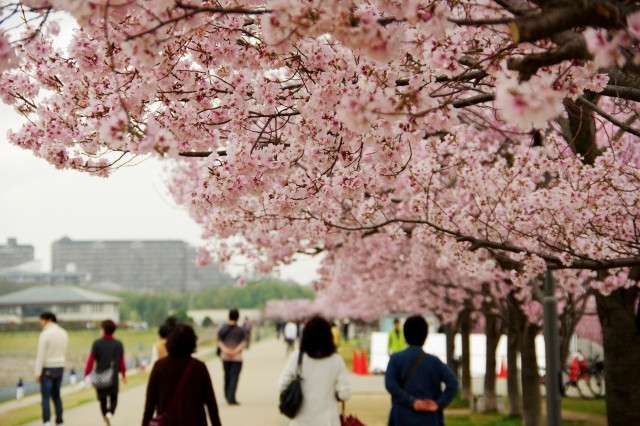
Now that we’ve come to the end of this article, we can only wish you the very best of luck in the journey ahead of you. Studying abroad is one of life’s greatest experiences and makes for an especially beautiful memory. Learn all you can learn, meet different people from different cultures, and visit an assortment of places. Have fun because your journey’s just begun.



































